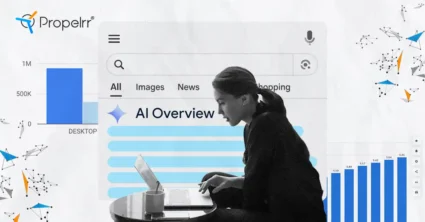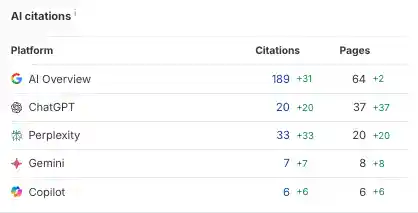AI Overview And SEO: What You Need To Know In This New Era
Author & Editor
Content Team Lead
Published on: Jul 25, 2025 Updated on: Aug 1, 2025

View this post on Instagram
Let’s face it. Google Search is changing fast. As an SEO Company in the Philippines, we've seen firsthand how strategies that worked yesterday might not work tomorrow.
In the past, if you ranked well, you got seen. That visibility equaled clicks, which translated into traffic and possible business opportunities. That simplicity was built around the central idea that Google rewarded relevance and authority with solid brand and marketing outcomes.
Ranking at the top of Google doesn’t guarantee what it used to. Because you might rank #1 and still watch your traffic plateau or even decline. Why? Google’s results pages have shifted. The 10 blue links are now surrounded by ads, AI-generated summaries, featured snippets, people also ask boxes, image carousels, and more.
To give the statistics, Search Engine Land even mentions how in March, 27.2% of U.S. searches ended without a click compared to 24.4% in March 2024; for the same period in the EU/UK, zero-click searches increased from 23.6% to 26.10%.
It's become even more crucial to understand customer intent more deeply than ever, and, increasingly, think beyond Google altogether.
The “new” and current era of Search
If you are wondering how the sands of search shifted, here is a brief contrast of old SEO vs. today’s strategic, user-first demands.
Before, there was a huge focus on how to target the right keywords, build backlinks, and optimize on-page elements — which were enough for your website's SEO to get ahead.
Now SEO has shifted to a more strategic and customer-first approach by digging deep into intent, creating original and genuinely helpful content, optimizing for experience, and earning your customer's trust.
Search algorithms have evolved and are now rewarding relevance, depth, and engagement over pure best practices— shifting focus from ranking for search engines to serving real people in real contexts.
In this new era, the rules didn’t change, but the mindset definitely has to.
Google’s AI Overview is the game-changer
Search features like Google’s AI Overview have caused real disruption.
Google’s AI Overview uses generative AI to summarize search results directly at the top of the page. Instead of listing your links for users to explore, it delivers quick, synthesized answers drawn from multiple sources right in the SERP.
The goal of Google AI Overview is speed and convenience, giving searchers what they need without requiring a click. But for the content marketers, creators, publishers, and brands, it marks a major shift where visibility no longer guarantees traffic, and where Google itself increasingly becomes both the gatekeeper and the destination.
The Evolution of SEO: From Positions to Presence
There's become a sort-of “Fewer Visits, More Opportunities” Paradox going around where where traditional SEO metrics are falling, but search visibility is increasing. As AI Overviews summarize answers directly in the search results, many queries now result in zero clicks because searchers usually get what they need without ever clicking to visit a website.
Google AI-generated Overview relies on trusted, high-authority sources to build quick answers. And if your brand is cited in those summaries, then your voice gets amplified not through clicks, but through influence. You may not get the visit that you want, but you do get seen. In some cases, share of voice on search is more valuable than it ever was.
It is no longer just about driving your traffic, but it is also about becoming the source Google AI-Generated Overview relies on. Your brand continues to show up repeatedly across AI-assisted touchpoints and be the authority that users trust without always needing a click.
Traditional ranking signals are being reinterpreted, and the path from search visibility to actual traffic is murkier than ever. SEO demands a far more strategic approach because success hinges on building topical authority, cultivating brand trust, and delivering real value to users in context-rich, intent-driven ways.
In this new era, SEO becomes less of a stored tactic and more of a brand strategy. The Content, UX, authority, and authenticity all play different role.
SEO as Strategic Brand Marketing
SEO is no longer just a channel for traffic; it is now evolving as a core part of strategic brand marketing. AI decides what content gets surfaced like well known brands with clear expertise and strong digital footprints are more likely to be featured, cited, and trusted.
Being present in answers, citations, and conversation matters more than just being “ranked.” Achieve this by establishing topical authority within your domain, creating quality content that aligns with your brand voice, and ensuring your brand is present not just in Google results but also other platforms. It’s how your expertise gets found, how your voice gets recognized, and how your authority is built.
Key Shifts and Strategies for AI-Era SEO
Shift # 1: Measure Share of Voice & Visibility, Not Just Position
Ranking for a few keywords isn’t enough to measure true performance. What matters now is how often your brand is cited in AI-powered answers, as this can directly influence visibility, credibility, and brand awareness.
We should begin tracking their presence across AI search experiences using tools like AI Overview trackers, or citations from ChatGPT and Perplexity to monitor how your brand appears in context.

To stay ahead, it’s essential to build topical authority by producing deep, high-quality content that addresses the full scope of user intent—not just keywords—positioning your brand as a trusted and relevant resource.
Shift # 2: Build Brand Authority (E-E-A-T in Action)
Google prioritizing credible, trustworthy sources make brand authority is more important than ever.
Brands that demonstrate strong E-E-A-T—expertise, experience, authoritativeness, and trustworthiness—are more likely to be featured in search results and AI-generated overviews.
Key strategies to establish this authority include publishing expert-authored and research-driven content, encouraging user-generated content like reviews and testimonials, and earning backlinks or mentions from reputable third-party sites. These efforts not only boost credibility but also increase the likelihood of your brand being surfaced in AI Overviews, ultimately improving visibility, influence, and user trust.
Shift # 3: Establish an Omni-Channel Presence
Relying solely on your website is no longer enough—modern SEO extends far beyond on-site optimization. To maximize visibility and engagement, brands must maintain a strong presence across multiple platforms where audiences actively seek information.
Key channels include community forums like Reddit and Quora, where brands can engage directly with user questions; video platforms like YouTube and TikTok, ideal for explainer and review content; and social media platforms such as LinkedIn, Facebook, and Instagram for consistent brand engagement.
Additionally, third-party mentions from industry sites, media outlets, and expert roundups boost credibility. With AI search engines pulling content from these sources, off-site visibility now plays a crucial role in validating brand authority and increasing the chances of being featured in AI-generated search results.
SEO’s Not Dead. It’s Rewired.
SEO has been rewired to be less about rank hacking, but more about building a credible digital footprint. The future of SEO belongs to brands that earn trust, not just clicks, be the brand that Google wants to cite.
To sum it all up with key takeaways:
- Search visibility goes to those who solve problems, not just those who frequently publish.
- Evaluate whether your content truly addresses user intent, offers value, and earns trust.
- Retool and re-think your approach in order to stay relevant, visible, and impactful.
If you have any further questions or need assistance, please contact us via our Facebook, X, or LinkedIn accounts. Consider subscribing to the Propelrr newsletter to remain up to speed on relevant insights and information on digital marketing.
